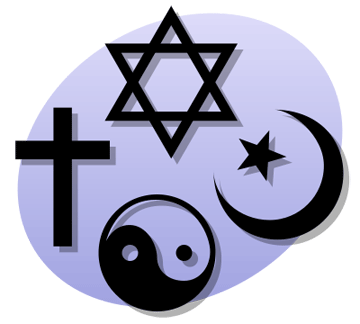
The War on Terror, upon which the GOP presidential candidates (minus libertarian Ron Paul) have been feasting, is promoted as a clash of civilizations masquerading as religions. In this pop culture scenario there is the secular West, which promises freedom of religion and only tolerates freedom from religion, vs. the fanatically religious non-West currently reduced to mad mullahs and Islamic Jihadists. We are told it is not about religion. That is true. It is, however, about religions. The West assumes it has tamed its religious impulse to crusade and colonize the Gospel to the ends of the commercially driven earth. Our religious wars are in the history books. Or are they?
Inquistors with holy orders have been replaced by mega-church preachers with rock-music intros. Witch trials have been overturned by a mentality that still thinks the 10 Commandments trump the U.S. Constitution. The United States is in legal theory not allowed by law to prohibit religious worship (although it did so against Native Americans). But America has only a veneer of secularism. Religious organizations no doubt take in more money than the IRS and not all that goes to charity. Much of this freedom of religion is an invitation to convert others or to promote outmoded notions such as biblical creation and Noah’s flood. The fact that half of the population in the U.S. still holds on to the myth of Adam and Eve as an explanation for human origins, despite the evidence from scientific research, says we are not yet free of irrational thinking.
Then there is “their” religions. At one time it was the pagan other. The Spanish conquistadores acted without restraint against native peoples that the church took its time (more than three decades) in deciding about their human souls. Africans might as well be slaves since they were in superstition “Curse of Ham” bondage to the Christian Devil anyway. Hindus had to male order their wives from throwing themselves on funeral pyres. New Guinea cannibals had to stop boiling the bones of courageous missionaries and drink the blessed blood of Christ instead. And Muslims were from the start a bunch of sword-clenching lunatics in desert-bleached robes.
So is it about religion or not? Let’s take the Middle East. Bombs go off everyday and people who call themselves Muslims, Jews and Christians get killed in the process. In each case the anger and hatred may be fueled by religious rhetoric, but political ideology is the driving force. So in this sense it would be wrong to simplify a complex set of motivations into ultimate blame for religion. Religion kills and always has, but religion also heals and always will. So the problem is hardly the abstract notion of belief in God and spirits or a moral system that makes the core of what we call religion. But it is about religions and religious sects. People are killing other people because of differences in the way religion is practiced and thought out, how verses written in stone are acted out on individuals with torn flesh and sacrificed blood.
There is indeed a problem with religious hate and intolerance. Lashing a rape victim, no less than condoning a death sentence for a Muslim turned Christian, is indefensible and horrible. Who would want to worship a God who would stand by and allow such savage mentality, let alone inspire it? But such egregious behavior does not let other theoretically secularized religions off the hook, including the domesticated varieties in the West. To paraphrase Gospel, because we obsess with the beam in our brother religion’s eye, we should first deal with the mote in our own. And on that mote …
Daniel Martin Varisco
[Republished on History News Network.]